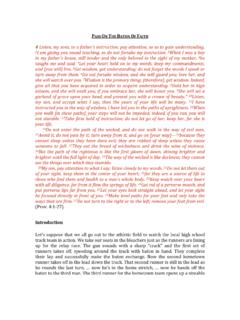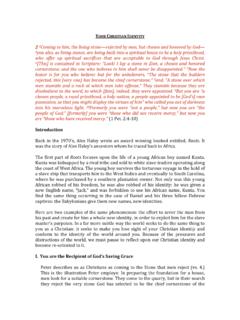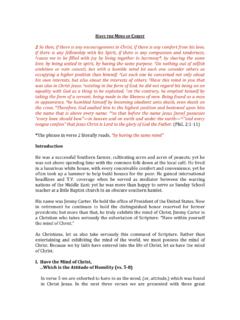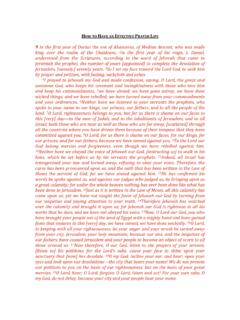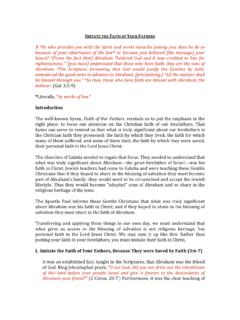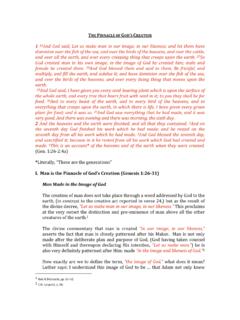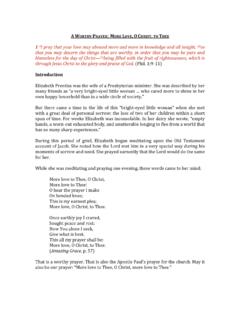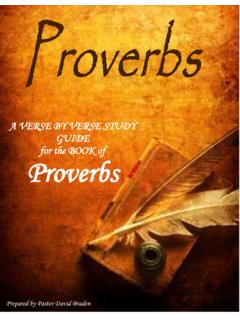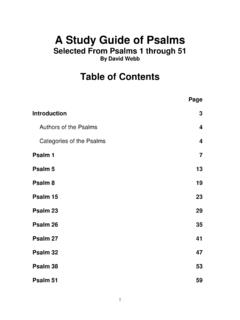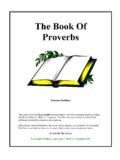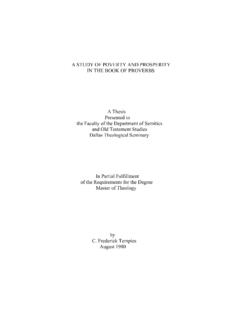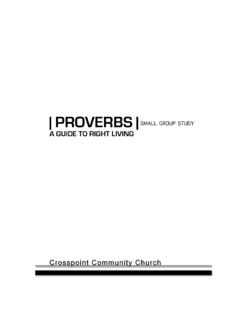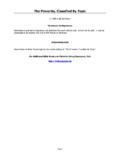Transcription of 10. Two Associations To Avoid - Bible Study Courses
1 TWO Associations TO Avoid 6 My son, if you have put up security for your neighbor, if you have shaken hands pledging yourself for a stranger, 2you are trapped by the words of your mouth, you have been snared by the words of your mouth. 3 Now, my son, do this and deliver yourself, seeing that you have fallen into your neighbor's hand: Go, humble yourself and persistently plead with your neighbor. 4 Allow no sleep for your eyes; no slumber for your eyelids. 5 Free yourself, like a gazelle from the hand [of the hunter], and like a bird from the hand of the fowler 12A worthless person, a man of iniquity, is he who goes around with a perverse mouth.
2 13He winks with his eye, he speaks with his feet, he makes signals with his fingers. 14In his heart is perverseness. He is constantly devising evil; he sows discord. 15 Therefore, his calamity will come upon him suddenly. All of a sudden he will be broken and there will be no remedy. 16 There are six things that Jehovah hates; indeed, seven things that are detestable to him: 17haughty eyes, a lying tongue, hands that shed innocent blood, 18a heart that devises wicked schemes, feet that are swift in running to mischief, 19a false witness who utters lies, and a man who sows discord among brothers.
3 (Prov. 6:1 5, 12 19) Introduction A long time ago the Greek philosopher, Socrates, asked a simple old man, For what are you most thankful? The man replied, I am most thankful for the type of friends I have had. He was referring to friends who promoted his well being, as opposed to those who would drag him down to ruin. (Our Daily Bread, 4/22/93) Our English word friend comes from the same root as the word freedom. A genuine friend sets you free to be what God intends for you to be. Conversely, there are those so called friends and acquaintances who can exert the opposite influence; far from contributing to your true freedom and well being, they bring you into bondage and lead you to destruction.
4 Let us now give our attention to this sixth chapter of Proverbs and consider two types of relationships and acquaintances that are detrimental to our well being; two Associations to Avoid . I. Avoid Becoming a Pledge for Someone Else's Debts Verse 1 warns us not to put up security for our neighbor; we are being warned not to pledge ourselves as surety. Surety means becoming legally liable for the debts or default of another person. By becoming surety, you are legally obligating yourself to pay the debt if that other person proves himself unable or unwilling to do so.
5 If you ever allow yourself to become surety you are allowing yourself to become trapped by the words of your mouth (vs. 2.) By the vow of commitment you have taken, whereby you have pledged yourself to be responsible for the other person's debts, you have fallen into your neighbor's hand (vs. 3.) You have subjected yourself to him and placed yourself in bondage to him by obligating yourself to be accountable for his financial responsibilities. This is what the Scriptures say about the man who allows himself to become surety for another: He who puts up security for a stranger will suffer for it; but whoever hates shaking hands in pledge is secure.
6 (Prov. 11:15;) once again, to put up security literally means to become surety. A man who lacks sense shakes hands in pledge and puts up security in the presence of his neighbor. (Prov. 17:18) Do not be one of those who shakes hands in pledge and puts up security for debts; 27if you lack the means to pay, your very bed will be taken away from under you! (Prov. 22:26 27) What counsel does Scripture give? Now, my son, do this and deliver yourself, seeing that you have fallen into your neighbor's hand: Go, humble yourself and persistently plead with your neighbor.
7 4 Allow no sleep for your eyes; no slumber for your eyelids (vs. 3 4.) There is the note of urgency: act now; take no rest until you have done all you can to deliver yourself from being surety. There is the counsel to persistently plead with your neighbor; that is to say, approach him with an urgent persistence even to the point of imposing upon him, soliciting him to release you from your suretyship. As an example of such persistent pleading, consider the widow in Jesus' parable: In a certain town there was a judge who neither feared God nor had any regard for men.
8 3 And there was a widow in that town who kept coming to him with the plea, Grant me justice against my adversary. 4 For some time he refused. But finally he said to himself, Even though I do not fear God or have any regard for men, 5yet because this widow keeps bothering me, I will see that she gets justice, so that she will not eventually wear me out with her continual coming. (Lk. 18:2b 5) The counsel is to humble yourself for the sake of your future and your well . being, forget your pride. If necessary, if it will be of any help, plead with your neighbor and even beg him to release you from the obligation you have taken upon yourself.
9 Do not delay and do not rest until you have done all you possibly can to extricate yourself from the perilous situation into which you have put yourself. The father further counsels his son, Free yourself, like a gazelle from the hand [of the hunter], and like a bird from the hand of the fowler (vs. 5.) Recognize that your life is at stake your whole future, your well being and that of your family and struggle as hard as you can to escape. What is the message of this passage? You must appreciate exactly what you are doing, what you are getting into, when you allow yourself to become surety for someone else.
10 You must be very sensible to the seriousness of your action and the devastating consequences that may result from it. This passage is not saying that suretyship itself is wrong, it is simply warning us that it is very dangerous. Note that the Apostle Paul allowed himself to become surety for the converted slave, Onesimus: "If he has done you any wrong or owes you anything, charge it to me. 19I, Paul, am writing this with my own hand. I will pay it back" (Philemon 18 19a.) The Lord Jesus made Himself surety for us: "Jesus has become the surety of a better covenant" (Heb.)
